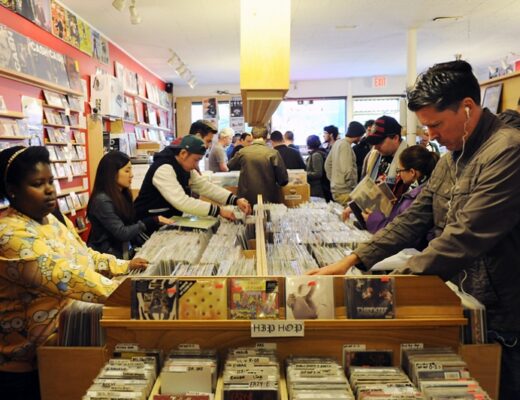As the winter chill sets in and the defrosting Mariah Carey for Christmas meme has circulated, December brings a unique atmosphere, one of nostalgia and celebration. However, for independent artists, this season presents a paradox. While it seems a tempting time to release new music, hoping to ride the wave of holiday cheer, there are several compelling reasons to reconsider your release strategy.
In this article, we will outline five of the main reasons why December might not be the ideal month for independent artists to debut their latest labours of love.
5 Reasons Why Independent Artists Should Avoid Releasing Music in December
-
The Nostalgia Factor
December is a time machine, transporting listeners back to the warm, familiar tunes of yesteryears. The airwaves are saturated with classic hits and melodies, leaving little room for new entrants. This nostalgia-driven trend means that new tracks from independent artists often struggle to find an audience amidst the sea of timeless classics.
-
Festive Frenzy Overload
The holiday season is a sensory overload – lights, shopping, family gatherings, and endless lists of obligations. Amidst this festive frenzy, music consumption patterns shift. People lean towards playlists that complement the season’s spirit, often side-lining new, unfamiliar music. This makes it challenging for independent artists to capture the attention of potential listeners.
-
Financial Constraints
With wallets stretched thin due to holiday shopping and year-end expenses, music fans are less likely to invest in new albums or extravagant merch bundles. This financial crunch can significantly impact the revenue potential for artists releasing new music in December. You don’t want to build momentum with a campaign only for your efforts to be wasted because people’s disposable income has been swallowed.
-
Year-End Reflections
As the year winds down, music enthusiasts and critics indulge in retrospection, compiling lists of the year’s best tracks and albums. New releases in December risk being overlooked in this reflective process, missing out on critical acclaim and end-of-year discussions.
-
Promotional Pitfalls
The competition for media coverage is fierce during the holidays, with every sector vying for a slice of the festive attention pie. Independent artists often find it challenging to secure promotional opportunities, as larger, established acts with hefty marketing budgets dominate the scene. Furthermore, just like in every other sector, people working in the industry take time off, including Radio DJs, promoters, pluggers, journalists and playlisters. Even though it may seem that the music industry is always operational, it is far from the case, especially for smaller-scale operations that are more likely to give up-and-coming artists attention!
Why It Pays to Be Strategic with Your New Release Dates
While the allure of a December release is understandable, independent artists might find greater success and engagement by choosing a less congested time. A strategic release in the new year, when listeners are refreshed and eager for new sounds, could be the key to making a more impactful musical statement.
It is vital to remember that the first month of a marketing campaign sets the stages, captures the most attention, and creates an initial impression that can significantly influence the trajectory of an artist’s release.
In the digital era of music, much of music discovery and promotion is governed by algorithms, particularly on streaming platforms and social media. A strong performance in the first month can signal these algorithms to promote your music more widely, increasing your reach and potential fan base.
When Is the Right Time to Release New Music?
Choosing the right time to release new music is a strategic decision for independent artists, balancing industry trends, audience availability, and promotional opportunities. While there’s no one-size-fits-all answer, certain periods tend to offer more favourable conditions:
Early to Mid-Spring (March to May)
Spring symbolizes new beginnings, and the music world is no exception. With the winter holidays and major award seasons behind, listeners are often eager for fresh sounds. This period is less crowded than the end-of-year rush, giving independent artists a better chance to stand out.
Late Summer to Early Autumn (August to October)
Releasing music in late summer or early autumn can be advantageous. The industry starts to buzz again after the summer lull, but it’s before the holiday season’s frenzy. This timing allows artists to capitalise on the back-to-school energy and catch listeners before they switch to their holiday favourites.
January to Early February
The start of the year can be a strategic choice for release. The post-holiday calm means less competition, and people are often in search of new music to kickstart their year. However, it’s important to launch your campaign after the New Year’s festivities to avoid getting lost in the holiday hangover.
Mid to Late Autumn (Late October to Early November)
Releasing music during this time can be a smart move, especially if you avoid clashing with major holiday releases. Listeners might be looking for new tunes to accompany the change of seasons, and there’s a window of opportunity before the holiday music takes over.
Weekdays for Launches
Regardless of the month, consider launching your music on a weekday, typically Friday, which is the global release day for new music. This aligns with the music industry’s standard and maximizes the chances of getting featured on new release playlists.
–
Remember, these are general guidelines. The best release time also depends on your specific audience, genre, and marketing strategy. For instance, if your music has a summery vibe, a spring or early summer release might work best. Additionally, consider your readiness – it’s better to release when you’re fully prepared, rather than rushing to meet an arbitrary date.
But What About Christmas Songs?
If you have dreamed of releasing a hit Christmas song, you might be disparaged to read WIRED’s scientific explanation of why there hasn’t been a hit Christmas song in years. We’re not counting the atrocities LadBaby inflicted upon the world, illustrating how culture in the UK has never been in a sorrier state.
The article outlines how nostalgia plays a pivotal role in the enduring popularity of classic Christmas songs. These tracks often passed down through generations, create a sense of comfort and tradition that new songs struggle to replicate. The article also highlights how songs from as far back as the 1970s continue to dominate the festive airwaves, underscoring the challenge for contemporary artists to break into this nostalgic stronghold.
Furthermore, the music industry has undergone significant changes, particularly in how music charts are perceived and used. The rise of streaming services and the decline of traditional sales metrics have altered the landscape, making it more challenging for new songs to achieve the ‘classic’ status of their predecessors. This shift is exemplified by acts like LadBaby, whose novelty songs have topped charts in recent years, reflecting a change in what drives popularity and success in the music industry.
Interestingly, the article notes that even massive hits like Mariah Carey’s “All I Want For Christmas Is You” took years to reach their iconic status. This suggests that while new Christmas songs may be released, they require time to embed themselves into the festive canon, a process that can take decades.
The current music landscape, with its focus on streaming and novelty, further complicates this scenario, making it a challenging feat for contemporary artists to create the next Christmas classic.
–
For more advice on how to make the best moves in your music career in 2024, keep following our blog, and always let us know about your latest releases by submitting your music for review on our top 10 UK music blog.
Article by Amelia Vandergast



1 Comment
Holiday Merch: A Boon or Bane for Independent Musicians? -
24 November 2024 at 3:00 pm[…] we have written about how the festive season is one of the worst times to release new music as the music industry slows down and fans are less receptive to new music given the frantic nature […]